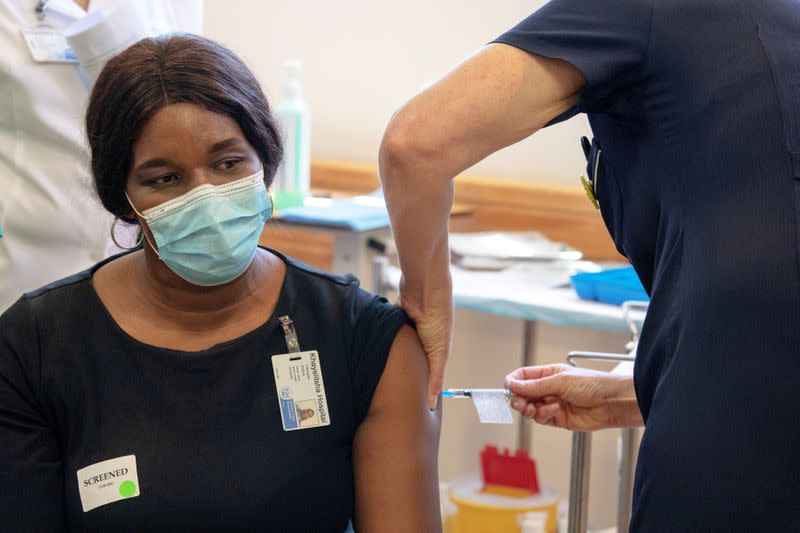By Alexander Winning
JOHANNESBURG (Reuters) – Two of the South African government’s top advisers on the COVID-19-supported Pfizer vaccine on Friday, despite a study earlier this week showing that the dominant local variant of the coronavirus may reduce the protective antibodies that it triggers.
The country has the injection of Pfizer, developed with the German partner BioNTech, to intensify its vaccination program after administering the first doses of Johnson & Johnson on Wednesday.
AstraZeneca vaccinations are suspended after a small local trial found that the injection offered minimal protection against mild to moderate diseases of the 501Y.V2 variant first identified last year.
The laboratory study published in the New England Journal of Medicine suggested that the 501Y.V2 variant may reduce the protective antibodies produced by the Pfizer vaccine by two-thirds.
But the scientists were quick to warn that since the study’s findings came from a laboratory, it was difficult to judge what they might mean in the real world.
Professor Barry Schoub, chairman of the Ministerial Advisory Committee on Vaccines, told Reuters that the two-third reduction in antibodies mentioned in the study “means that there is a very significant neutralizing potency left, … we feel that Pfizer is still a very good in our context “.
The advisory committee held its regular weekly meeting on Thursday and discussed the study.
Although it has not been established in a clinical trial that the Pfizer vaccine protects against the more contagious 501Y.V2 variant, “we can have reasonable extrapolation because it is such a potent immune system stimulator,” said Schoub, adding that authorities would monitor it closely. close to those who get the Pfizer vaccine.
Health Minister Zweli Mkhize said on Wednesday that South Africa initially expected 500,000 doses of the Pfizer vaccine and about 7 million doses by June.
‘WITHIN TOLERABLE LIMITS’
Professor Salim Abdool Karim, another government adviser, said in a separate interview that the reduction in neutralizing activity identified in the study was “within the tolerable limits of what we can accept”.
It is important, he said, that it has not yet been established that antibodies against the spike protein that the virus uses to infect human cells correlate with protection.
“It is one of many hypotheses being investigated,” he said, adding, “We don’t know what these vaccines lead to protection for.”
Asked if he would recommend stopping Pfizer’s vaccinations for now, he said: “No, actually the opposite. This is within our tolerable neutralization limits.”
He said there was little point in doing a clinical study to test the Pfizer vaccine against the local variant because it was already being adapted with a 501Y.V2 insert. “So, if we had to start a clinical study, when we get the results they would already have their new vaccine,” he continued.
South Africa, with almost 1.5 million cases and more than 48,000 deaths, recorded almost half of COVID-19 deaths and more than a third of confirmed infections in Africa.
It lagged behind the wealthiest nations in launching its immunization campaign.
(Reporting by Alexander Winning; Editing by John Stonestreet and Nick Macfie)
